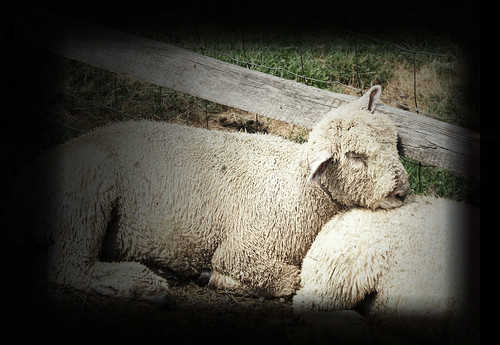
A glimpse into the sheep pen at the Billing's Farm in Woodstock Vermont, through a TTV filter. Picture by Rick Morley.
The following is a reflection on Matthew 25:31-46, the Gospel lesson appointed for November 20th, 2011, Christ the King Sunday, Year A according to the New Revised Common Lectionary. On this site there is also
• a reflection on the Psalm for the same day.
Jesus talks about salvation in different contexts to different audiences and in different ways throughout the Gospels.
Sometimes he’s pretty cryptic. Sometimes he’s a little clearer. Sometimes he speaks in parables and stories. But, nowhere else does Jesus so explicitly tell us who’s going to Heaven and who’s going to Hell like he does in the twenty-fifth chapter of Matthew.
In Matthew 25, there’s that theme of separation again. Jesus divides humanity into two teams: the sheep and the goats. The sheep go to his “right hand,” are declared “blessed” by their Father, and “inherit the kingdom prepared for them since the foundation of the world.”
When it is all said and done, they go into “eternal life.”
The “goats” on the other hand, aren’t quite as fortunate. They go to his “left hand,” are declared “accursed,” and are relegated to “the eternal fire prepared for the devil and his angels” for an eternity of “punishment.”
Stop and ask yourself, which team would you prefer to be on? I think Jesus makes this choice a pretty easy one.
Now, how do we get on the sheep team? How do we get picked for sheep duty? Well, the Good News is that Jesus tells us in detail.
…for I was hungry and you gave me food, I was thirsty and you gave me something to drink, I was a stranger and you welcomed me, I was naked and you gave me clothing, I was sick and you took care of me, I was in prison and you visited me.
Folks who do such things get to play on the sheep team, where the signing bonuses are out of this world.
The “goats” on the other hand, let hungry people go hungry. They don’t bother giving thirsty people anything to drink. They ignore strangers, letting them know that they are absolutely unwelcome. And they don’t give clothes to people who need them, don’t visit the sick and lonely, and let people rot in jail or prison without a thought.
It’s interesting to notice the importance of this teaching being given by Jesus in the last week of his life.
In fact, this is one of the last things Jesus says to his followers before he’s nailed to the cross in the Gospel of Matthew. What Jesus is doing here, at the end point of his earthly ministry, is making it very clear to people who claimed to be his disciples and supporters that there is no gray area at all when it comes to following him.
You’re either with him, or you aren’t.
The way to tell which it is, is by looking at how you live your life. To be on Jesus’ side means that you’re actively caring for the poor, the needy, the sick, and the lonely. To not do such things means that you’re really not with him at all, but against him. And if you’re against him, the signing bonus carries with it fire and brimstone.

This being one of Jesus’ last teachings should add some weight to this message. After all, who remembers the coach’s locker room speech from some game in the middle of the season? But, the one before the big championship game is blazoned into our hearts and minds forever.
It’s also interesting and important to notice how incredibly ignored this passage is.
The more liberal-minded denominations and theologians who have a preeminent concern for social justice utilize it almost exclusively. Amazingly, it’s almost completely overlooked by denominations and sects that are predisposed to “evangelism” and “saving souls.” You’d think that Jesus’ clearest teaching about the how and why of whose souls are “saved” and whose aren’t, would be at the top of their list! But, check out evangelical radio stations, pulpits, or tracts and see how often this section is quoted, used, or even alluded to.
This begs two questions: First, can we really throw out a teaching that Jesus gave in the last week of his life just because it doesn’t seem to fit with our theology? Do we just pretend that Jesus didn’t mean what he was saying, or that this section isn’t about salvation? (Even when it so clearly is.) Second, is Jesus saying that we have to earn our ticket to heaven by doing good deeds to people who need them?
I don’t think so, on both counts.
One of the amazing things about this lesson from the last few pages of Jesus’ earthly life is that the sheep didn’t know that they were earning heaven by their actions! These sheep said:
Lord, when was it that we saw you hungry and gave you food, or thirsty and gave you something to drink? And when was it that we saw you a stranger and welcomed you, or naked and gave you clothing? And when was it that we saw you sick or in prison and visited you?
They had no idea that their good deeds meant that they were inheriting the Kingdom prepared for them. They weren’t trying to earn God’s favor, or sneak around his mercy. The sheep weren’t fending for themselves, desperately trying to avoid punishment and earn eternal rewards for themselves.
They just saw people in need, and they served them. They were just living their lives of faith the way that they always did. They were living their lives focused on God and the needs of others instead on themselves and their own needs.
The difference between some group of sheep doing these deeds trying to get to heaven, and sheep doing the same exact deeds unaware of the incredible consequences, is that the actions of the latter group are authentic. They are genuinely loving their neighbor, and genuinely serving the needs of others, instead of selfishly looking out for themselves.
And, in the last week of Jesus’ life, that is the kind of life Jesus is calling his followers to live.
This is what loving our neighbor as ourselves is about. Loving our neighbor just to get ourselves to heaven wouldn’t be real love, it’d be selfishness. Preoccupation with our own salvation therefore is exactly what Jesus is warning us against. When you’re living your life loving your neighbor, you don’t have time to selfishly worry about YOU!
The Good News here is that there is no checklist of good deeds to fill out.
Jesus is talking about a manner of living here, and it’s one that isn’t motivated out of the fear of Hell or the hope of heaven, but a life that’s driven by an authentic love.
It’s a manner of life that recognizes that Christianity isn’t about us! It’s not about self-preservation, feeling good, or getting front row seats in Heaven.
If this isn’t crystal clear from the sheep and goats story, read on in the Gospel of Matthew until you get to the crucifixion. There, Jesus demonstrates the exact same selfless, genuine, and authentic love that he demands of us. He was flogged, mocked, tortured, and executed for God and for us, not for himself. It wasn’t some selfish egomaniacal stunt to gain fame and fortune. He loved God and us with his life and his death, and that is exactly what he asks of us.
And with that, it makes sense that Jesus gives this lesson in the last week of his life. It also makes sense to replace the well-known query used by modern evangelists, “Are you saved?” with the more appropriate, “Do you genuinely love God and your neighbor, not for your own gain, but for true brotherly and Godly love?”
Yeah, it takes a little longer to spit that out, but so do most important things.
Being sheep of the shepherd isn’t about us. Nor is it about being saved, or getting rewards, however eternal they may be. Being sheep of the shepherd is about following our shepherd’s lead, and loving others as he has loved us and given himself for us, an offering and a sacrifice to God. (Ephesians 5:2)
8 Comments